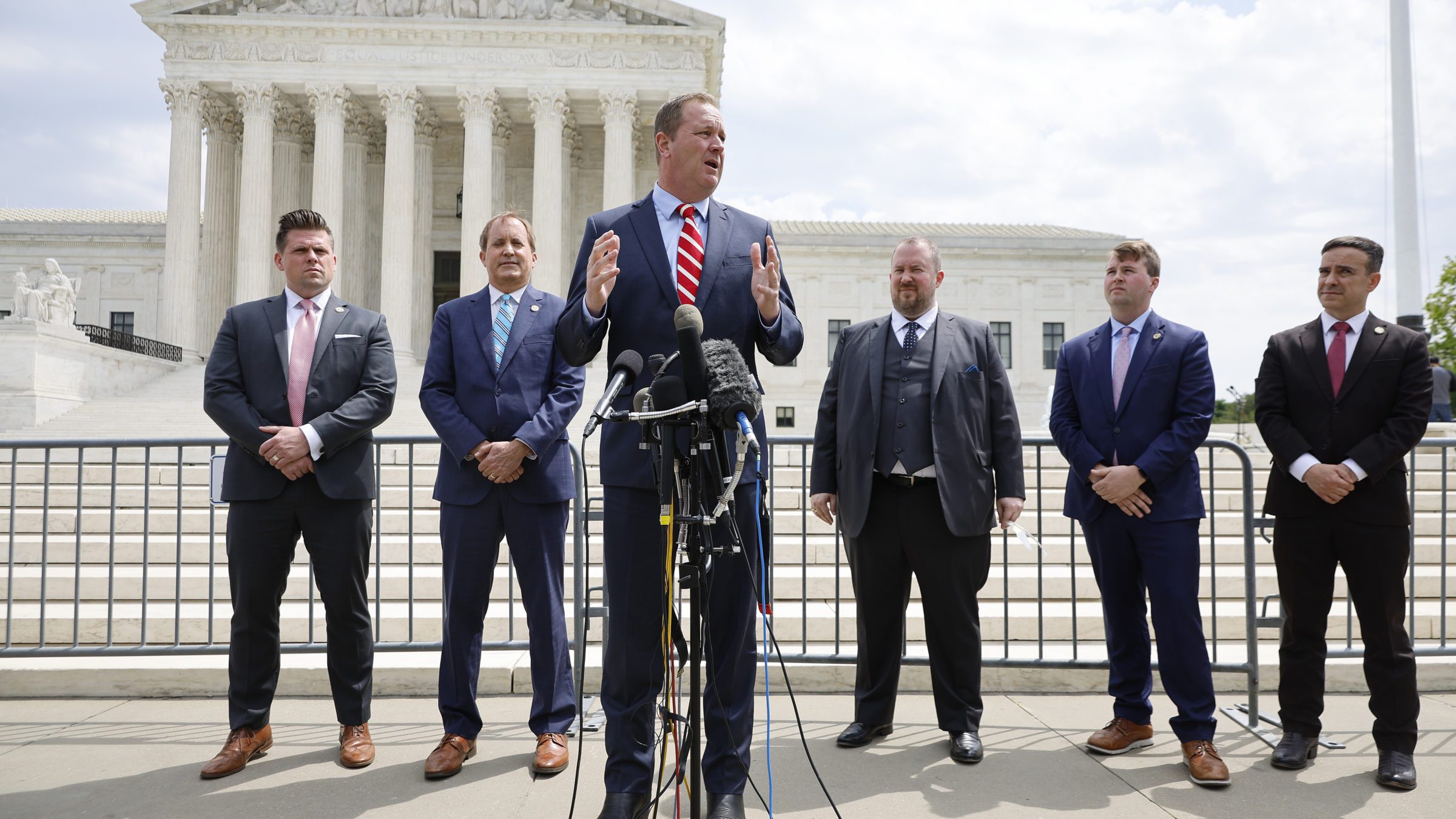On Tuesday, the Supreme Court heard oral arguments in Biden v. Texas, a case about whether a single federal judge can dictate national immigration policy from the bench. The arguments reflected a dramatic shift in the Overton window around the authority of judges in immigration law, which courts have long held requires deference to the politically accountable branches. That Texas, with the help of a Trump-appointed judge, has succeeded in strong-arming the Biden administration for eight months and counting is a predictable outgrowth of the conservative movement’s takeover of the legal system.
The Migrant Protection Protocols, or “Remain in Mexico,” is a Trump-era policy that requires asylum seekers to do exactly that: wait for their court dates in squalid camps on the Mexico side of the border for months on end. Yet despite President Joe Biden’s efforts to rescind this program since taking office, multiple courts have insisted he cannot do so. In court filings, states like Texas and Missouri invoked the specter of uncontrollable hordes of asylum seekers sapping limited state resources if allowed to cross the border. Imagine the horror: undocumented people applying for drivers’ licenses!
In August 2021, however, a Trump-appointed district court judge sided with Texas and Missouri, holding that the Biden administration hadn’t properly addressed states’ interests. Perhaps most shockingly, the court held that rescinding “Remain in Mexico” was illegal because it would result in what CBP agents, in practice, have always done: releasing people from detention while their claims are processed. If the Department of Homeland Security cannot detain everyone, Judge Matthew Kacsmaryk wrote, the law “implicitly demands, or, at the very least, directs DHS use its authority to return certain aliens to Mexico.”

Interesting, what would we say the lawyers arguing on behalf of Texas all have in common (Photo by Chip Somodevilla/Getty Images)
Texas has long had a problem with Democratic presidents exercising prosecutorial discretion in immigration matters. In June 2012, President Barack Obama launched the Deferred Action for Childhood Arrivals (DACA) program, which created a presumption against deportability for undocumented people who were brought to the U.S. as young children. In 2014, Obama sought to expand DACA and to launch DAPA, which would have deferred the deportations of many undocumented parents with children who were U.S. citizens or legal permanent residents, too. But in 2015, Texas and nine other states sued to stop DAPA and the DACA expansion, convincing a district court judge that Obama had overstepped his authority. Eventually, the Court affirmed this result in a one-sentence, 4-4 decision in 2016.
After President Donald Trump’s victory in 2016, Texas Attorney General Ken Paxton sought to end DACA once and for all, reconvening the states in the DAPA lawsuit to write a letter demanding that Trump rescind it. (For good measure, the states threatened to amend their original complaint to target DACA if Trump didn’t comply.) Trump announced the program’s rescission shortly thereafter. But after three years of litigation, in 2020, a 5-4 Court held that this move was arbitrary and capricious under the Administrative Procedure Act. Justices Thomas Gorsuch and Alito dissented in part to note their belief that the DACA program was itself “unlawful.”
On remand to the district court level, Judge Andrew Hanen, a George W. Bush appointee, agreed with Thomas, Gorsuch and Alito, holding that the program is unlawful. As a result, while existing DACA recipients can apply for renewals of their status, DHS cannot accept new applications or grant new work authorization permits. This outcome, which is currently pending before the Fifth Circuit Court of Appeals, has effectively allowed state politicians in Texas to block a groundbreaking federal immigration policy simply because they didn’t like it.
Fast forward to this week’s oral argument in Biden v. Texas, a sort of supercharged version of the DACA litigation. This time, the Court is considering judicial intervention not to block a disfavored policy, but to affirmatively prescribe sweeping changes to the country’s asylum system. That the Court is even considering this question shows how weak the purported “plenary power” doctrine, which supposedly affords special deference to the political branches on immigration matters, has become.
Astoundingly, Texas Solicitor General Judd Stone argued to the justices that the forced reimplementation of Remain in Mexico, which necessarily requires coordination and negotiation with the Mexican government, doesn’t implicate the foreign relations considerations that should caution against intervention here. Justice Elena Kagan could not hide her incredulousness. “What do you mean it doesn’t require negotiation with a foreign power? What are we supposed to do? Just drive truckloads of people into Mexico and leave them?,” she asked.
Justice Sonia Sotomayor, too, took Stone to task for his casual assertion that a federal judge could rewrite immigration law to require the government to detain every single asylum seeker who arrives at the border. “You’re now telling us that we as judges should be in the business of deciding whether that policy choice is one that we think—who wants? That we as a Court want?,” she said.
Texas’ stance here—that a judge can tell a president how to deal with a foreign government—contrasts sharply with past Court decisions like Hernandez v. Mesa, where the justices declined to hold a Customs and Border Protection agent liable for the death of a Mexican teenager he shot to death near the border. ”Both the United States and Mexico have legitimate and important interests that may be affected by the way in which this matter is handled,” the Court said at the time. “It is not our task to arbitrate between them.” It seems that judicial reluctance to “arbitrate” between two sovereign nations waxes and wanes depending on what the particular judge thinks about the value of the life before them.
Since taking office, Biden has sought to unwind some of his predecessor’s most xenophobic policies. But the willingness of Texas and other Republican-controlled states to sue to reinstate those policies—and of Trump-appointed judges happy to lend a hand—has thwarted this effort, as they push to entrench a dystopian reality in which people are punished and incarcerated for exercising their fundamental human rights. Trump has been gone for more than a year, but for migrants, it is as if he never left.
An earlier version of this article misidentified Judd Stone as Texas’s Attorney General. He is Texas’s Solicitor General.

